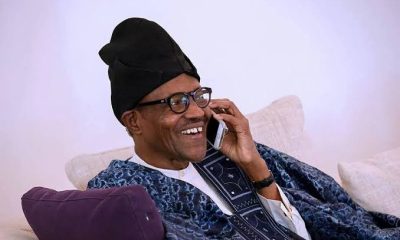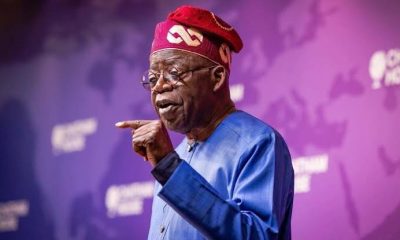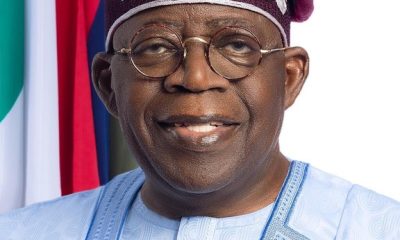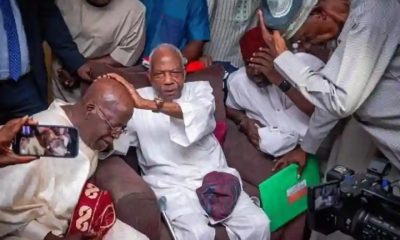Headline
Muhammad Pate Declines GAVI Position For Appointment As Tinubu’s Minister
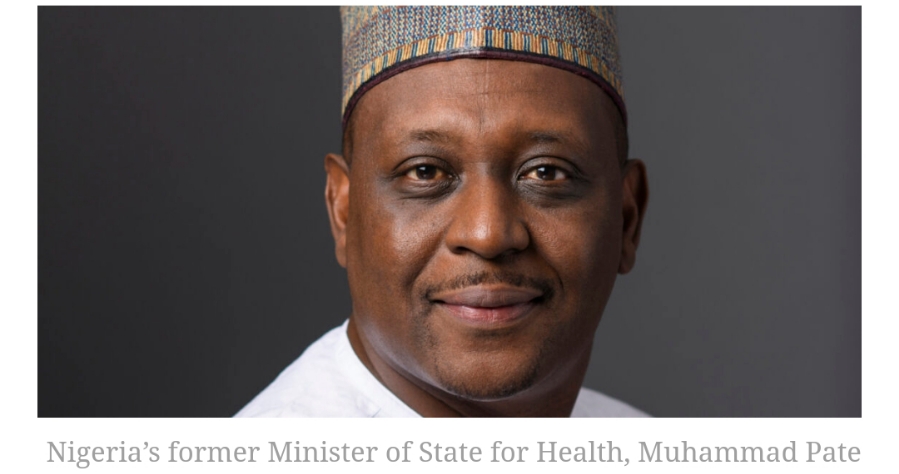
Ex-Nigerian minister declines top global position for possible appointment as Tinubu’s minister
On Monday, the global vaccine alliance, GAVI, announced Mr Pate’s decision to decline his appointment as its Chief Executive Officer (CEO).
Strong indications emerged on Monday that Nigeria’s former Minister of State for Health, Muhammad Pate, may make the ministerial list of President Bola Tinubu.
Mr Tinubu, who was sworn in as Nigeria’s 16th president in May, is yet to send the list of his ministers to the National Assembly as required by law.
As stipulated by law, Mr Tinubu is expected to forward the list of his preferred cabinet members to the parliament within 60 days of his assumption of office. But almost one month after he was sworn in, he is yet to appoint any ministers.
Pate’s hint
On Monday, the global vaccine alliance, GAVI, announced Mr Pate’s decision to decline his appointment as its Chief Executive Officer (CEO).
Mr Pate, who was scheduled to assume office as GAVI’s CEO on 3 August, informed the organisation that “he has taken an incredibly difficult decision to accept a request to return and contribute to his home country, Nigeria.”
His reason for rejecting GAVI’s appointment has raised speculations that he may be considering a position in Mr Tinubu’s cabinet.
While PREMIUM TIMES could not reach Mr Pate, a source who works with President Tinubu confirmed that Mr Pate’s name was on the list of guests scheduled to see Mr Tinubu “about two weeks ago.”
The source, however, could not confirm if the president eventually met him.
GAVI’s Appointment
Gavi had on 13 February approved the appointment of Mr Pate as its next CEO.
Mr Pate, a medical doctor, was to replace Seth Barkley, also a medical practitioner, who is expected to end his 12-year reign as the organisation’s CEO on 3rd August.
Gavi announced Mr Pate as Mr Berkley’s successor, even as it promised to continue its work to support routine immunisation, outbreak response and COVID-19 vaccinations worldwide.
Rejection
Gavi, in a statement published on its website on Monday, said the board decided to appoint David Marlow, currently Gavi’s Chief Operating Officer, to the position of Interim Chief Executive Officer, effective 3 August.
It said the appointment follows a communication from Mr Pate, that he will not be able to join Gavi.
“Mr Pate informed the Gavi Board Chair and Vice Chair that he has taken an incredibly difficult decision to accept a request to return and contribute to his home country, Nigeria,” Gavi wrote.
“Gavi fully respects the decision and wishes Mr Pate the very best for the future. On informing Gavi, Mr Pate thanked the Chair of the Gavi Board, José Manuel Barroso, the diverse set of Gavi Board members and partners, current CEO Seth Berkley, and the secretariat staff for their support over the last few months, commenting that he will remain a steadfast champion of the Gavi mission.”
About Pate
A medical doctor trained in both internal medicine and infectious diseases, with an MBA from Duke University in the United States, Mr Pate is currently the Julio Frenk Professor of Public Health Leadership at Harvard Chan School of Public Health and has served on several health-focused boards and expert panels in the public, private and not-for-profit sectors during his career.
He served as the Global Director for Health, Nutrition, and Population of the World Bank and Director of the Global Financing Facility at the World Bank between 2019 and 2021. He led the Bank’s $18 billion COVID-19 global health response and represented the bank on various boards, including those of Gavi, the Global Fund, CEPI and UNAIDS.
As Nigeria’s Minister of State for Health between 2011 and 2013, he led a flagship initiative to revive routine vaccinations and primary healthcare, chaired a presidential task force to eradicate polio and introduced new vaccines into the country.
About GAVI
Gavi, the vaccine alliance, is a public-private partnership that helps vaccinate half the world’s children against some of the world’s deadliest diseases. Since its inception in 2000, Gavi said it has helped to immunise more than 981 million children, and prevented more than 16.2 million future deaths.
The organisation said it has also helped to halve child mortality in 73 lower-income countries.
Gavi said it also plays a key role in improving global health security “by supporting health systems as well as funding global stockpiles for Ebola, cholera, meningococcal, and yellow fever vaccines.”
After two decades of progress, the organisation said it is now focused on protecting the next generation, “above all the zero-dose children who have not received even a single vaccine shot.”
Gavi is a co-convener of COVAX, the vaccines pillar of the Access to COVID-19 Tools (ACT) Accelerator, together with the Coalition for Epidemic Preparedness Innovations (CEPI), the World Health Organisation (WHO), and UNICEF.
Headline
EFCC bars dollar transactions, orders embassies to charge in naira

The Economic and Financial Crimes Commission has barred foreign missions based in Nigeria from transacting in foreign currencies and mandated them to use Naira in their financial businesses.
The EFCC has also mandated Nigerian foreign missions domiciled abroad to accept Naira in their financial businesses.
The anti-graft agency said the move is to tackle the dollarisation of the Nigerian economy and the degradation of the naira
The Commission, therefore, asked the government to stop foreign missions in Nigeria from charging visa and other consular services in foreign denominations.
The EFCC gave the advisory in a letter to the Minister of Foreign Affairs, Amb. Yusuf Tuggar, for onward transmission to all foreign missions in the country.
In the letter, the EFCC said it issued the advisory because the practice of paying for consular services in dollars was in conflict with extant laws and financial regulations in Nigeria.
In a letter dated April 5, 2024, which was addressed to the Minister of Foreign Affairs, Ambassador Yusuf Tuggar, titled: “EFCC Advisory to Foreign Missions against Invoicing in US Dollar,” the EFCC Chairman, Ola Olukoyede expressed dismay over the invoicing of consular services in Nigeria by foreign missions in dollars.
The EFCC cited Section 20(1) of the Central Bank of Nigeria Act, 2007, which makes currencies issued by the apex bank the only legal tender in Nigeria.
The letter read, “I present to you the compliments of the Economic and Financial Crimes Commission, and wish to notify you about the commission’s observation, with dismay, regarding the unhealthy practice by some foreign missions to invoice consular services to Nigerians and other foreign nationals in the country in United States dollar ($).
“It states that ‘the currency notes issued by the Bank shall be the legal tender in Nigeria on their face value for the payment of any amount’.
“This presupposes that any transaction in currencies other than the naira anywhere in Nigeria contravenes the law and is, therefore, illegal.”
The commission further stated that the rejection of the naira for consular services in Nigeria by certain missions, along with non-compliance with foreign exchange regulations in determining service costs, is not just unlawful but also undermines the nation’s sovereignty embodied in its official currency.
The letter continues: “This trend can no longer be tolerated, especially in a volatile economic environment where the country’s macroeconomic policies are constantly under attack by all manner of state and non-state actors.
“In light of the above, you may wish to convey the commission’s displeasure to all missions in Nigeria and restate Nigeria’s desire for their operations not to conflict with extant laws and regulations in the country.”
Diplomatic sources said yesterday, May 10, that some embassies were wondering whether the EFCC’s advisory represented the position of the Federal Government.
Headline
Prince Harry visits sick Nigerian soldiers in Kaduna

Prince Harry and his team visited the 44 Nigerian Army Reference Hospital in Kaduna to interact with wounded soldiers who are receiving treatment.
The Duke of Sussex is in Nigeria with his wife to champion the Invictus Games, which Harry founded to aid the rehabilitation of wounded and sick servicemembers and veterans.
Nigeria joined the Invictus Community of Nations in 2022 becoming the first African country to join.
Prince Harry’s visit to Kaduna came 68 years after his late grandmother Queen Elizabeth II visited the state during the time of the late Premier of Northern Region Sir Ahmadu Bello.




-

 Headline5 days ago
Headline5 days agoSuspend cybersecurity levy– Reps to CBN
-

 Business5 days ago
Business5 days agoNigeria needs over $2bn to revive Ajaokuta Steel Plant, says Minister
-

 Headline3 days ago
Headline3 days agoPrince Harry visits sick Nigerian soldiers in Kaduna
-

 Entertainment3 days ago
Entertainment3 days agoAMVCA Cultural Day: BBNaija’s Neo, Venita win Best Dressed Male, Female
-

 Headline5 days ago
Headline5 days agoTinubu resumes work after foreign trip
-

 News5 days ago
News5 days agoShan George’s money returned to Zenith Bank account
-

 Metro3 days ago
Metro3 days agoEx-Sports Minister laments after hospital neglected him for hours over N80000 deposit

